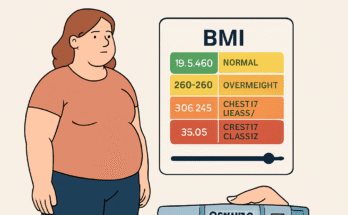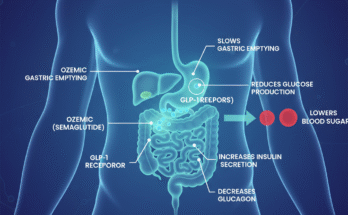If you’ve recently started Ozempic and noticed your heart racing after an injection, or experienced sudden heart palpitations, you’re not alone in wondering whether this popular diabetes and weight loss medication could be the culprit. Understanding the relationship between Ozempic side effects and heart symptoms is crucial for anyone taking this GLP-1 receptor agonist medication.
What Are Heart Palpitations and Why Do They Matter?
Heart palpitations are sensations where you become acutely aware of your heartbeat. You might experience heart pounding on Ozempic, feel your heart fluttering while on Ozempic, or notice Ozempic making your heart beat fast. These sensations can manifest as:
- A racing or rapid heartbeat (tachycardia)
- Irregular heartbeat or skipped beats
- A pounding sensation in your chest, neck, or throat
- Fluttering feelings that may last seconds or minutes
While occasional palpitations are common and often harmless, understanding their connection to medications like Ozempic is essential for your cardiovascular safety and overall wellbeing.
Understanding Ozempic: How Semaglutide Works
Ozempic (semaglutide) belongs to a class of medications called GLP-1 receptor agonists, which also includes similar drugs like Wegovy and Rybelsus. These medications work by mimicking a natural hormone called glucagon-like peptide-1, which helps regulate blood sugar levels and appetite. When prescribed for type 2 diabetes or weight management, semaglutide offers several metabolic benefits, but like all medications, it can produce side effects.
The mechanism of action involves multiple body systems, including:
- Stimulating insulin secretion when blood sugar is elevated
- Slowing gastric emptying to increase satiety
- Reducing glucagon secretion
- Acting on brain receptors that control appetite
While Novo Nordisk’s Ozempic has demonstrated cardiovascular benefits in certain populations, individual responses can vary significantly.
Does Ozempic Affect Heart Rate? What Clinical Research Shows

One of the most common questions patients ask is: does Ozempic affect heart rate? The answer is nuanced and requires examining both Ozempic clinical trials cardiovascular data and real-world patient experiences.
Ozempic Cardiovascular Safety Profile
According to the Ozempic prescribing information cardiac section and FDA-approved medication guide, heart palpitations are not listed among the most common side effects. The major cardiovascular outcome trials, particularly the SUSTAIN-6 study, showed that semaglutide actually reduced the risk of major adverse cardiovascular events in patients with type 2 diabetes who had established cardiovascular disease.
However, semaglutide heart rate variability has been observed in some studies, with slight increases in resting heart rate documented during treatment. These Ozempic and increased heart rate instances are typically modest, averaging 2-4 beats per minute above baseline values.
Semaglutide Cardiovascular Effects: The Complete Picture
The cardiovascular benefits of semaglutide are well-documented for reducing heart attack and stroke risk in high-risk populations. Yet, individual patients may still experience Ozempic heart racing symptoms or other cardiac sensations. The key is distinguishing between:
- Direct cardiac effects: Changes in heart rate or rhythm caused by the medication’s pharmacological action
- Indirect effects: Symptoms arising from other side effects like dehydration or electrolyte imbalances
- Coincidental factors: Unrelated cardiovascular issues that happen to occur during treatment
Common Causes of Heart Palpitations While Taking Ozempic
1. Ozempic Dehydration and Heart Palpitations
One of the most significant indirect causes of palpitations relates to fluid balance. Ozempic nausea and related gastrointestinal symptoms can lead to inadequate fluid intake or excessive fluid loss through vomiting. Dehydration directly affects heart function by:
- Reducing blood volume, forcing the heart to beat faster
- Triggering sympathetic nervous system activation
- Creating electrolyte imbalance that affects cardiac electrical activity
2. Electrolyte Imbalance and Ozempic
The connection between electrolyte imbalance and Ozempic deserves special attention. When experiencing gastrointestinal side effects, patients may lose crucial minerals like potassium, magnesium, and sodium. These electrolytes are essential for proper cardiac electrical conduction. Low levels can trigger:
- Irregular heartbeat patterns
- Increased susceptibility to arrhythmias
- Enhanced awareness of normal heartbeats
3. Ozempic Anxiety and Heart Racing
The psychological dimension shouldn’t be overlooked. Starting a new medication, particularly one associated with significant body changes, can trigger anxiety. The challenge lies in distinguishing Ozempic panic attacks vs heart palpitations—both can produce similar symptoms including chest tightness, rapid heartbeat, and feelings of distress.
4. Blood Pressure and Metabolic Changes
Ozempic blood pressure changes can occur as your body adjusts to weight loss and improved metabolic function. These fluctuations, particularly during the first week of Ozempic heart side effects period, may manifest as palpitations or awareness of your heartbeat.
Ozempic Cardiac Side Effects: When Should You Worry?
Understanding the Ozempic Tachycardia Connection
While true Ozempic and arrhythmia relationships are uncommon, tachycardia (heart rate over 100 beats per minute at rest) has been reported by some patients. This Ozempic tachycardia connection warrants medical evaluation, especially if accompanied by:
- Ozempic chest pain symptoms
- Shortness of breath or difficulty breathing
- Dizziness or lightheadedness
- Severe fatigue or weakness
- Fainting episodes
Semaglutide and Irregular Heartbeat: Red Flag Symptoms
Certain symptoms require immediate medical attention. Stop taking Ozempic and seek emergency care if you experience:
- Severe, persistent chest pain
- Rapid heartbeat combined with difficulty breathing
- Loss of consciousness
- Severe dizziness or confusion
- Symptoms of allergic reaction with very rapid heartbeat
The relationship between atrial fibrillation and Ozempic, while not definitively established in clinical trials, warrants monitoring in patients with pre-existing cardiac conditions.
Is Ozempic Safe for Heart Patients?
This crucial question depends on individual cardiovascular history. The Ozempic cardiovascular safety profile shows that for many patients with established heart disease and type 2 diabetes, semaglutide actually provides protective cardiovascular benefits. However, personalized risk assessment is essential.
Who Should Exercise Caution?
Discuss your complete medical history with your healthcare provider if you have:
- History of arrhythmias or irregular heartbeat
- Previous heart attack or stroke
- Thyroid disorders (note: thyroid medication and Ozempic heart interactions may occur)
- Current use of medications that affect heart rhythm
- Family history of cardiac arrhythmias
Wegovy vs Ozempic Heart Issues
Both Wegovy and Ozempic contain semaglutide, but at different approved dosages. Wegovy is approved specifically for weight management at higher doses (up to 2.4 mg weekly), while Ozempic is approved for type 2 diabetes (up to 2.0 mg weekly). The cardiovascular considerations are similar, though higher doses may carry slightly increased risk of side effects.
Rybelsus heart palpitations concerns follow similar patterns, though this oral formulation of semaglutide may have different absorption characteristics affecting how side effects manifest.
How to Stop Heart Palpitations from Ozempic
If you’re experiencing palpitations while taking Ozempic, several strategies may help:
Immediate Management Steps
- Hydration is Critical: Drink adequate water throughout the day, aiming for at least 8-10 glasses daily
- Monitor Your Electrolytes: Consider electrolyte-rich beverages, especially if experiencing nausea or vomiting
- Track Your Symptoms: Document when palpitations occur, their duration, and associated activities
- Practice Stress Reduction: Deep breathing exercises, meditation, and relaxation techniques can help manage anxiety-related palpitations
Managing Ozempic Side Effects Palpitations Long-Term
For sustained management, consider:
- Ozempic Dosage Adjustment: Your healthcare provider may recommend reducing your dose to find the optimal balance between therapeutic benefits and side effects
- Timing Your Injection: Some patients find that timing their injection differently in relation to meals or activities reduces symptoms
- Nutritional Support: Ensure adequate intake of potassium-rich foods (bananas, sweet potatoes) and magnesium-rich foods (nuts, leafy greens)
- Regular Monitoring: Schedule follow-up appointments to track your cardiovascular response to treatment
When to Stop Taking Ozempic: Heart Issues as Decision Factors
The question “should I continue Ozempic with heart palpitations” requires careful consideration with your healthcare provider. When deciding when to stop taking Ozempic heart issues play a central role, but the decision involves weighing:
- Severity and frequency of symptoms
- Therapeutic benefits you’re receiving
- Availability of alternative treatments
- Your underlying cardiovascular risk profile
Talk to Doctor About Ozempic Heart Symptoms: What to Discuss
Prepare for your appointment by documenting:
- Detailed symptom description (frequency, duration, triggers)
- Complete medication list, including over-the-counter supplements
- Recent changes in weight, blood pressure, or blood sugar
- Any other new symptoms you’ve experienced
- Your concerns and treatment goals
Ozempic Alternatives Without Heart Side Effects
If cardiovascular symptoms become problematic, several Ozempic alternatives without heart side effects may be considered:
Other GLP-1 Receptor Agonists
Different GLP-1 agonist formulations may produce different side effect profiles. Options include:
- Trulicity (dulaglutide)
- Victoza (liraglutide)
- Mounjaro (tirzepatide) – a dual GIP/GLP-1 receptor agonist
Each GLP-1 agonist heart palpitations risk profile varies slightly, and what doesn’t work for one patient may be well-tolerated by another.
Alternative Diabetic Medications
For managing type 2 diabetes, other diabetic medication heart effects should be evaluated, including:
- SGLT2 inhibitors (which also show cardiovascular benefits)
- DPP-4 inhibitors (generally well-tolerated)
- Traditional medications like metformin
Weight Loss Medication Heart Effects Comparison
When considering weight loss medications, compare the cardiovascular impact of different options with your healthcare provider. Some newer medications specifically demonstrate cardiovascular protection, while others may carry different risk profiles.
Understanding Semaglutide Cardiotoxicity Studies
Scientific research on semaglutide cardiotoxicity studies has been extensive. The current evidence suggests:
Positive Cardiovascular Outcomes
Multiple large-scale trials demonstrate that semaglutide:
- Reduces risk of major adverse cardiovascular events (MACE)
- Lowers risk of cardiovascular death in high-risk populations
- Provides benefits for Ozempic stroke risk factors reduction
- May reduce Ozempic heart attack risk in patients with established disease
Potential Concerns Under Investigation
Ongoing research examines:
- Ozempic QT interval prolongation: Studies investigating whether semaglutide affects the heart’s electrical recovery time
- Long-term cardiac remodeling effects
- Sympathetic nervous system activation patterns
- Individual variation in cardiovascular response
Special Considerations and Risk Factors
First Week Ozempic Heart Side Effects
The initial adjustment period often presents the most pronounced symptoms. Many patients experience sudden heart palpitations starting Ozempic during dose initiation or escalation. These symptoms frequently improve as your body adapts to the medication.
Ozempic Withdrawal Heart Symptoms
Some patients report symptoms when discontinuing semaglutide, though Ozempic withdrawal heart symptoms are not well-documented in clinical literature. Any concerning symptoms during medication discontinuation should be reported to your healthcare provider.
Type 2 Diabetes and Heart Palpitations: The Underlying Connection
It’s important to recognize that type 2 diabetes itself carries cardiovascular risks. Heart palpitations may relate to blood sugar fluctuations, diabetes-related autonomic neuropathy, or other complications rather than medication effects.
Ozempic FDA Warnings and Patient Safety
The Ozempic FDA warnings heart section doesn’t specifically list palpitations as a primary concern, but the medication guide emphasizes several cardiovascular considerations:
- Monitoring for signs of thyroid tumors (which can affect heart function)
- Awareness of diabetic retinopathy complications
- Recognition of pancreatitis symptoms
- Kidney function monitoring
Regular review of Ozempic patient reviews heart problems on reputable medical platforms can provide insight into real-world experiences, though these should be interpreted cautiously and discussed with healthcare professionals.
Conclusion: Balancing Benefits and Cardiovascular Concerns
The relationship between Ozempic and heart palpitations is complex, involving direct pharmacological effects, indirect consequences of side effects, and individual patient factors. While heart racing or palpitations are not among the most common side effects documented in clinical trials, some patients do experience these symptoms.
The key takeaways for patients considering or currently taking Ozempic include:
- Heart palpitations are not typical but can occur, especially related to dehydration or electrolyte imbalances
- Most cardiovascular effects are protective in high-risk populations with diabetes
- Individual monitoring is essential to catch concerning symptoms early
- Many strategies can help manage palpitations if they occur
- Open communication with healthcare providers ensures optimal treatment outcomes
If you’re experiencing concerning cardiac symptoms while taking Ozempic, don’t hesitate to reach out to your healthcare provider. The benefits of this medication for many patients are substantial, but ensuring your treatment plan is safe and effective requires personalized medical oversight. Your heart health is paramount, and adjustments to dosage, timing, or even switching medications can often resolve problematic symptoms while preserving therapeutic benefits.
Remember that managing type 2 diabetes or pursuing weight loss is a journey that should optimize both metabolic health and cardiovascular wellbeing. With proper monitoring and communication, most patients can safely use Ozempic and achieve their health goals without significant cardiac concerns.

Lisa Caldwell is a clinical health writer and certified diabetes educator with a strong background in pharmacology and metabolic health. With over 12 years of experience in patient education, she specializes in translating complex research on GLP-1 medications like Ozempic into clear, practical guidance.




